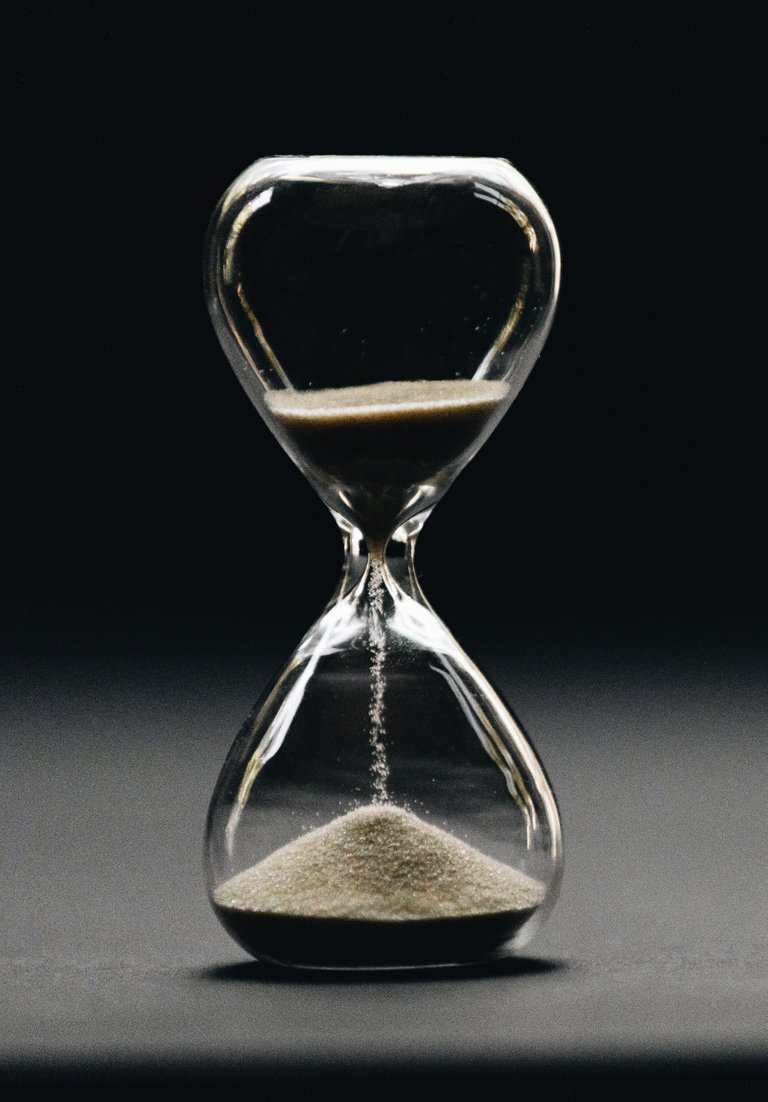If you're reading this post, then it's most probable that you're a fellow Hiver of mine. You have seen with your own eyes, how the blockchain technology and cryptocurrencies have grown in just over a decade. I think it's safe to use a word revolution here: the changes so big and so radical, that are bound to crush the current economical and even social system. It's just a matter of time.

* * *
You see, time is the key, everything is bound by it and happens within it. Every change, whether evolutionary or revolutionary, takes some time. We humans tend to think about time as a linear phenomenon, and although it arguably is a linear phenomenon—at least from the physical point of view—it is far from linear when it comes to our perception of it.
I bet you know that feeling, that as you get older, the time seems to accelerate. You recall your childhood and those days feel like they were weeks. You woke up to days which were full of opportunities, chances of doing and learning something new, days which were long and the time seemed endless. Maybe you even had times, where you wondered how it will be to be an adult—but it seemed so far in the future, that it may as well never come. But as you get older, the days pass ever as quickly, especially that for most of us every day means the same: you wake up in the morning and spend at least a few good hours in your job. There's also a lot of things to do after it: do some shopping, clean up the house, visit a doctor... Sun just went up and it now it's ready to hide again after that hill—if only you could catch it...
It's a song which I look onto now with some distance, but it still rings that nostalgic bell.
There are many theories about why our perception of time is skewed so that it seems to accelerate as we get older. One of the most known of these theories proposes that we feel the time by unique and emotionally intense events that happen in time. One day of your childhood is so stuffed with new experiences, that a whole month of your adult life would probably come out pale in comparison. Generally, the more unique and important events happen, the longer the time period in which they happened seems. Stanford Encyclopedia of Philosophy has a great article called The Experience and Perception of Time, where you can read more about time as a phenomenon and our perception of it.

All in all, the experience of time for most of us, if not all of us that that time accelerates. Moreover, it seems to accelerate faster and faster as we age. A little bit like the speed of time grew in an exponential manner. Exponential growth is a hot topic recently, and for a reason. We hear how the exponential economic growth of last 100-150 years destroyed our ecosystems and societies, and can no longer be continued—we have to shift to either de-growth or sustainable growth paradigm. We can also hear a lot about how our technological development is happening in an exponential rate, and how hard it is to wrap our linear-adjusted minds around it. This is especially the case for blockchain and tokenization of everything, which seem to be the technology who many cannot properly understand and which is highly underestimated by most.
I would even risk proposing a theory, that most of historical events that have come to be called revolutions, are the result of this ever growing pace of change. Take the neolithic revolution as an example. It was the fairly rapid adoption by our hunters-gatherers ancestors of the new agricultural lifestyle. This revolution spanned around 6000 years, starting from 10000 BC. This is a duration that we wouldn't even consider, we can hardly foresee how the world and our lives will look like in 5 years. This comes from the rate of change acceleration.
But does it mean that we shouldn't try to foresee our distant future and its possible difficulties? Of course not. And the fact that our predictions might be completely off is obvious, but we should still make them. If the world does not evolve in a determined direction, then mankind these predictions and acting on them might actually change the course of history. And if there is a Zeitgeist, a determined story for all the universe, then we can at least have some fun guessing.
* * *
@taskmaster4450 published a post a month ago, listing 10 things that will be gone by 2035. I was especially touched by the last point: death. It struck me once again, because I feel like the topic is becoming more and more popular and widely discussed. And this is no surprise: the vision of getting rid of our mortality is bound to stimulate anyone's imagination, but also turn on the inner philosopher. @taskmaster4450 notes that his prediction is a little bit reckless, but it was perky enough that I decided to go deeper...

we manage to get rid of mortality by 2035, or even 2050. Whether this improvement will be available to common people, or only the chosen few is a different kind of topic, but let's assume that I somehow might be able to extend my life indefinitely. Whether it's by growing a new body in a lab and simply transferring my mind (the consciousness) to it any time the old body decays too much, or by means of mind uploading—it doesn't matter. Let's just assume that in whatever way what I consider to be me is practically immortal.Looking almost 15 years into the future is a hard thing, obviously. But let's assume that @taskmaster4450 is right and
The future of the universe is not something that we can know for sure. There are many mutually exclusive theories on how will it look like and whether the universe will have an end—and if so, how will it look like. But as is always the case, we have to base on what's most probable and wait for next generations to prove us wrong.
So anyway, did I tell you that predicting what will happen in 15 years is hard? Well then, let's try to look further away... More like 10^1000s years in the future. But why?! You see, by the most widely accepted theory of the universe's future, in this distant future it will be approaching its so-called Heat Death. At this point universe will reach the state of thermal equilibrium and there will basically be no thermodynamic free energy, and all the matter will basically degenerate into single photons and leptons.
Obviously, having an effectively empty universe with basically no atoms and no free energy to use in any way, means that even if my mind was uploaded and active up until then—there will no longer be possibility to have the necessary hardware running that would allow my mind to keep on existing. Everything needs energy.
What that all means that if all of the above assumptions are right, then I will live long enough for this heat death of universe to be actually within my lifetime and will become a problem for me. I know you might think that googols of years from now is something that far away, that it's not worth to worry about it right now. But remember where we started this article: the exponential function and how its behavior tricks us all the time. The way you should think about this is that until 2035 (conventionally) this is just a theoretical problem, but in 2036 it's no longer theoretical, but something that you will have to tackle in your life.
The fool's question—my question—is: what is the aim and where does this end?

* * *
DOCETISM — Cloud of Unknowing
Very thought provoking. Great article. I do sometimes wonder if I'm just gonna miss the cut with technology improvements. My luck, my time to stop walking this Earth will the year before life becomes immortal! But at least I would have missed out on the heated hell that awaits in the distant future :-)
Congratulations @mciszczon! You have completed the following achievement on the Hive blockchain and have been rewarded with new badge(s) :
Your next target is to reach 2000 upvotes.
You can view your badges on your board and compare yourself to others in the Ranking
If you no longer want to receive notifications, reply to this comment with the word
STOP